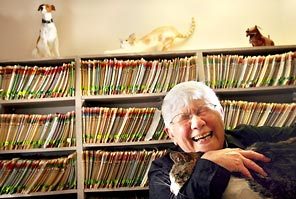|
Older Workers Looking More Glamorous to Recruiters
By Kristen Gerencher, Seattle Times
April 27, 2008

Mary
Buhr, 77, who works in the accounts-receivable department at Wheat Ridge Animal Hospital near Denver, poses with a restless cat named Waldo.
AARP is adding three federal government agencies and six private companies to its list of employers looking to hire people 50 and older for full-time, part-time and seasonal jobs.
The Internal Revenue Service, the Peace Corps and the U.S. Small Business Administration's Office of Disaster Relief are the newest members and the first federal employers on AARP's National Employer Team. That brings the total number of employers in the three-year-old partnership to 38, said Deborah Russell, director of work-force issues for AARP in Washington, D.C.
A number of private health-care and home-care companies also are joining the roster, including Scripps Health, Bright Horizons Family Solutions, Home Instead Senior Care, Synergy HomeCare, AnswerNet and Vedior North America.
Older Americans can check job opportunities and apply online at no cost through the AARP Web site, regardless of whether they're one of the group's 40 million members.
More employers are catching on to the benefits of hiring older workers, Russell said. "They recognize the fact that mature workers bring good experience and skills to the workplace."
"Many see lower turnover rates [among] mature workers," Russell said.
"More importantly, some recognize this is a labor pool they will have to pull from because they don't have the ability to attract younger workers to these kinds of jobs," Russell said.
Some baby-boomer workers who tap the AARP employer network want more flexibility in their work lives but don't see themselves retiring to pursue leisure activities for what could be another 20 or more years, Russell said.
"The vast majority are people who are looking to transition into new job opportunities who are still working," she said. "You have people who may even be retirement-eligible but are looking to transition into new job opportunities doing something different than what they've been doing for many years."
Others find they can't retire even if they want to stop working, and need to develop new career strategies.
About 69 percent of boomers plan to work past the traditional retirement age of 65, and most cite the high cost of health care and insufficient savings as reasons, Russell said. "People have come to the realization that 'Yeah, I have to work longer because I simply won't have enough money to retire.' "
The Partnership for Public Service, a nonprofit group encouraging civil service, announced two new partnerships as well, including private-sector partner IBM, which is helping its 350,000 current and retired workers learn about and potentially be hired into government jobs.
The Treasury Department is the first government agency to sign on as a partner, and it needs to fill nearly 14,000 high-priority jobs in the next two years, said Max Stier, president of the Partnership for Public Service in Washington.
About 42 percent of the federal work force is over the age of 50, according to the Partnership.
"The federal government is facing a tsunami of retirements," Stier said. "We expect over the next five years that over half a million folks will be leaving. We've identified 193,000 mission-critical positions that will need to be filled in the next two years."
Two million people work for the federal government, 85 percent of them outside of Washington, Stier said.
Jobs will need to be filled in fields as diverse as engineering, economics, public health, law enforcement, security, technology, management and accounting.
The group is particularly interested in boomers who may be retiring from their private-sector employers.
"They want challenging work where they can make a difference," Stier said. "The federal government has job opportunities in virtually any profession one could consider, from astrophysics to zoology. You're not only helping the American people, you're likely to be working on our most challenging problems as a nation, too."
Many people are attracted to government jobs in part because they offer solid health benefits, and the public sector is known for its workers' long average tenures, Stier said.
Still, the federal government historically hasn't hired many people at more experienced levels.
"We need to create additional channels of entry into government service with the expectation that some people will stay throughout their entire career," Stier said, noting that demographic shifts are forcing agencies to modernize their tactics.
"The government has to move from a career model to a career-builder model," he said.
More Information on US Elder Rights Issues
Copyright © Global Action on Aging
Terms of Use |
Privacy Policy | Contact
Us
|



